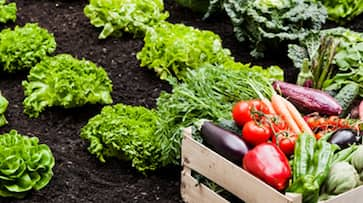Why friendships are akin to growing a garden

I've been trying to grow a few of our most commonly used kitchen vegetables and herbs in pots on the garden. Our weedy little chilli plant—which we had given up on ever sprouting actual fruit (vegetables)—turned into an honest to goodness chilli bush, about hip-high and the chillis I pluck off it are so supremely sharp, I usually don't need more than one to flavour a dish. They taste better than the chillis I buy too—maybe because of the act of running on to one's terrace and snapping one off a bush is so much more satisfactory than taking one out of a chilled plastic packet in the fridge.
Inspired by this, I decided to grow some more—and this time, I was going to get really professional about it and do it with seeds instead of an already sprouted plant. In little pots across the terrace, my housekeeper (who has a green thumb which would be the envy of many gardeners) and I set out common veggies: tomatoes, cucumber, methi, and even some more chillis to fulfil my dream of having a hot pepper hot spot where I grow everything from the lethal raja mirchi to the more mellow jalapeno.
Week three, and only one of my pots is sprouting. I suspect it's the cucumber—neither the housekeeper nor I thought to label any of the soil, so we'd know what was coming up—and as I press down experimentally on the red soil of the other two pots, I wonder what I did wrong with them, or at least, what I could have done differently. You've probably guessed by now that this whole gardening thing is an elaborate metaphor for the states of some friendships—with some, you sow the seeds and voila, almost with no interference at all, a little seedling pops up, and all you have to do is nurture that plant until it grows big enough for you to get fruit off of it.
With other friendships, like some plants, they'll never thrive in your garden. It's just not right for them. Your garden, personally, is great, lots of plants and butterflies and trees all growing and flowering, but for this plant, it's not suitable. It would rather be in the ground than in a pot. It would rather have more sun. It would rather have less sun. Or it just didn't “take” to being uprooted and placed in your home. It was happier where you found it. It's not your fault and you have to learn to let it go.
With even more friendships, you do everything right, you have all the ideal conditions, you're doing it just like your research told you, you should and for all your pains, you have nothing—just a pot filled with soil. You thought you had sowed it with the best seeds, you were waiting for something to happen, and it remains stubbornly infertile no matter how hard you try.
Also read: The curious case of open relationships
But for all that, there are the plants you've all but given up on, straggly ones that lost all their leaves, spindly ones that refused to sprout any new colour at all, and so on, and then they burst out one by one, into great glorious green rewards. These are the ones you put little or no effort into, you water their soil and you check in and there are five new flowers the next day, waiting just for you.
And I have hope that my little plantless pots, waiting hopefully with seeds in them, will one day magically turn into seedlings while my back is turned. Maybe I just need to put them in the sun a little more, maybe I need to add a few more seeds. Maybe this time, they'll grow into plants that will reward me for years to come.

Meenakshi Reddy Madhavan is the author of five books, most recently a YA novel about divorce called Split and a collection of short stories about love called Before, And Then After. The views expressed here are her own
















